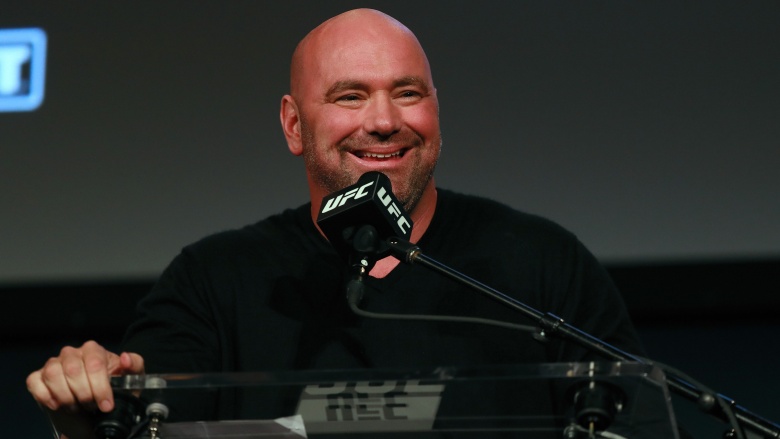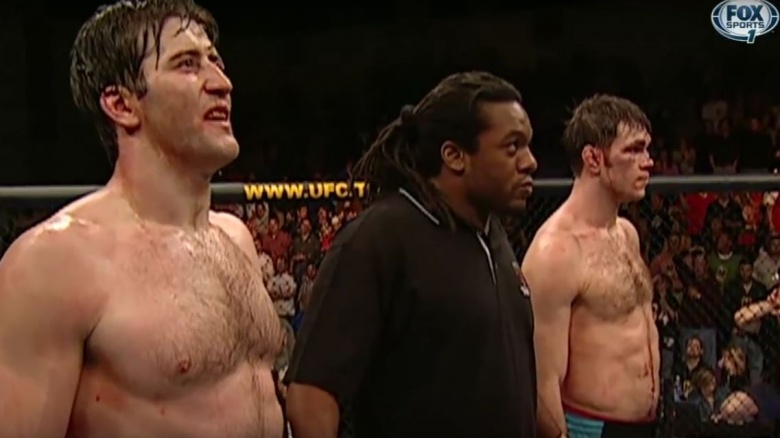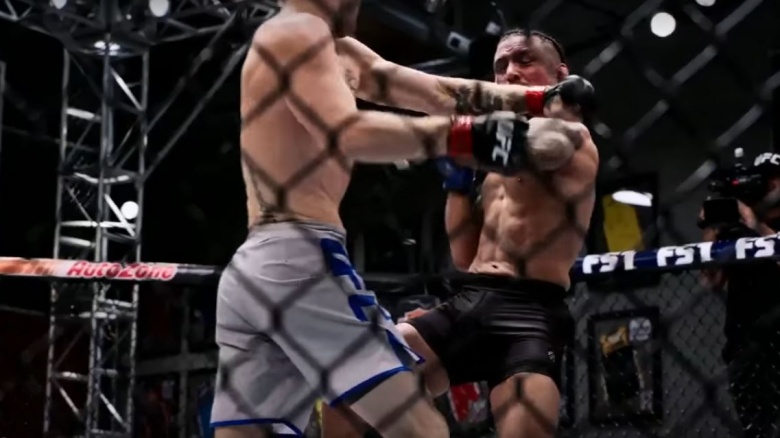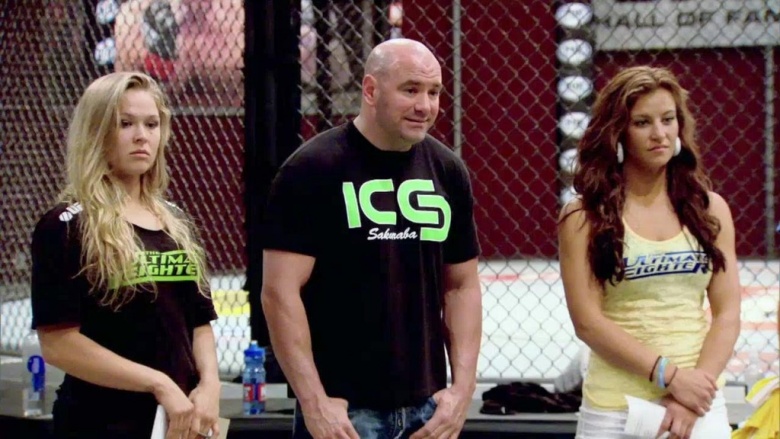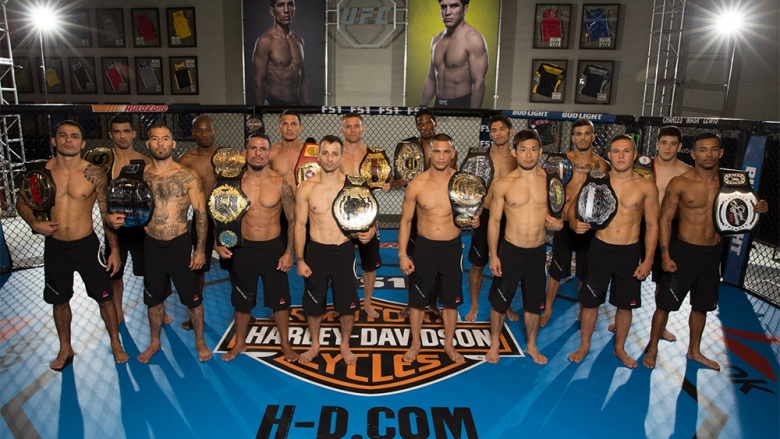The Untold Truth Of The Ultimate Fighter
The Ultimate Fighter, or TUF, is fairly unique as far as reality TV shows go. TV audiences were already familiar with physical competitions in the form of the Amazing Race and Survivor, but what set TUF apart was that episodes often culminated in brutal showdowns between two fighters.
It was the success of that very first season in 2005 that lifted the MMA from the fringes of competitive sports, turning the UFC into a household name. Thanks to the widespread accessibility allowed by social media, UFC doesn't rely too heavily on the The Ultimate Fighter for publicity these days. Still, TUF has its place in UFC history — and some pretty fascinating tidbits that every fan of the series should know.
The Ultimate Fighter is why the UFC exists today
As MMAJunkie observed, "the UFC would likely no longer exist were it not for the show." But to be more specific, not only would there be no UFC, the company's absence would have greatly impacted the futures of MMA figures like Anderson Silva, Georges St. Pierre, Ronda Rousey, Jon Jones, and Conor McGregor. These are names many current UFC fans may have never heard of had it not been for the legendary fight between TUF Season 1 finalists Forrest Griffin and Stephan Bonnar.
The successful conclusion of first season of The Ultimate Fighter was a shock, as Spike TV initially intended it to be a one-season event. However, the publicity and positive public reaction — viewership swelled to 10 million as the finale fight progressed — was simply too strong to ignore. In Dana White's own words (spoken in the video above), the UFC owners and network reps cut a deal for a new season "literally in the alley where all the trucks were." It wasn't a particularly glamorous moment, but the experiment's success would prove to be the first step of many, leading the UFC down a path of global success that would make them the first name in mixed martial arts.
Dana White managed certain TUF coaches before becoming UFC president
Today, we know Dana White as the brash, controversial figurehead who sits atop the Ultimate Fighting Championship empire. Yet before there was an Ultimate Fighter, or even a proper UFC as we know it, Dana White worked as a manager for MMA fighters Tito Ortiz and Chuck Liddell. And before that gig ... he worked as a valet.
Said White, "I was a bellman at the Boston Harbor Hotel. I was 19 years old. All the experiences I had with jobs from 17 to 19 helped me get to here. [I] realized this isn't what I want to do. I really don't care about money. I care about getting up every day and doing something I love to do." And what he wanted to do was get into the fighting business. Despite his own roots in boxing, Dana White was drawn to MMA. And in an interesting twist, Chuck Liddell was the "Team Blue" coach during The Ultimate Fighter Season 1, and Liddell would coach again in Season 3, opposite ... Tito Ortiz. Dana's kids were all grown up!
The WWE inadvertently helped The Ultimate Fighter premiere
In addition to a groundbreaking first season, the UFC might owe a bit of its existence to World Wrestling Entertainment. Prior to WWE's Monday Night Raw getting moved to the USA Network, the show was a centerpiece for Spike TV. It seemed logical from a ratings standpoint that the experimental TUF series would work best alongside Raw. The decision seemed to benefit TUF, as the Spike time slot saw a 38 percent jump in ratings with the Ultimate Fighter, thanks in large part to acting as a lead out to Raw. There's a strong possibility that, had TUF followed something else, the show might not have shown enough promise to even make it to that historic Griffin/Bonnar fight.
The decision to grant Stephan Bonnar a contract was spur of the moment
One of the most memorable aspects of the Rocky-like battle between Bonnar and Griffin is that, technically, there wasn't a loser. UFC commentator Seth Rogan called it a "razor-close fight" and even Bonnar acknowledged that he felt either Griffin or himself "could get the nod." Griffin was eventually declared the winner by unanimous decision, which meant he won the coveted six-figure UFC contract. However, Dana White decided to ask UFC owners Lorenzo and Frank Fertitta if it were possible for Bonnar to be granted a contract as well. They agreed, and White announced that Bonnar was also in. It was a last-minute decision that further ingratiated the UFC to a brand new audience.
TUF fights are sanctioned as exhibitions to avoid spoilers
The fights shown on The Ultimate Fighter are all sanctioned through the Nevada Athletic Commission as "exhibitions," even though they're very much competitions. This is important for two reasons. First, as reported by MMAWeekly, the fights don't count toward a competitor's professional record, so losses occuring on the show don't impact a fighter's win/loss ratio. This does, however, start to change once participants reach the semi-final stage. For instance, a semi-final win or loss can count towards a fighter's UFC record. Fighters that progress to the season finale fight will see the outcome added to their professional record, as those fights happen during a live pay-per-view event. This is why The Ultimate Fighter Season 7 winner Amir Sadollah's UFC record stands at 7-5, while his overall fight record is currently 6-5.
The second reason? Well, getting the fights labeled as exhibitions allows The Ultimate Fighter to keep the fight results a secret right until the episode airs. Otherwise, if they were labelled as real competitions, the results of each season would be spoiled weeks in advance, and what fun is that?
Rampage Jackson's memorable season 10 meltdown was probably legit
If you caught Season 10 of The Ultimate Fighter, you'll remember the rivalry between coaches Quinton Jackson and Rashad Evans — a TUF Season 2 winner — was particularly tense. After his fighter lost a close bout that went to the judges, Jackson decided to live up to his "rampage" nickname in memorable fashion.
In the above video, you can see Rampage make quick work of a door, tearing it to pieces during a terrifying temper tantrum. While it was one of the most insane moments to ever take place on TUF, many show fans remain skeptical that the door in question was even real. After all, upon multiple viewings of the chaotic moment, it looks like Jackson is destroying cardboard meant to resemble door rather an actual door. Even Dana White comments that the remnants of the door closely resemble "egg crates."
Did "Rampage" Jackson go crazy on an actual door? Actually, it looks like he did. After all, most modern doors aren't made of solid wood or steel. It's also important to remember what a door's primary function is: to open and close. It's hard to call a door that accomplishes this function "fake." It appears Jackson tore down a fiberglass flush door with a honeycomb hollow core interior, and a hollow core interior can be — and often is — made out of cardboard.
So it looks like Jackson really did obliterate a door on The Ultimate Fighter, albeit a rather cheaply-made door. Still looked pretty cool, though.
The Rousey/Tate rivalry wasn't played up for the cameras
The Ultimate Fighter series had it share of intense coach rivalries over the seasons. Few were more intense than the one between Ronda Rousey and Miesha Tate, whose mutual dislike stretched back to their days in the now-defunct Strikeforce. It might have something to do with how Rousey won the women's bantamweight title from Tate, dislocating Tate's arm in the process.
Another factor is Tate's boyfriend Bryan Caraway, who infamously referred to Rousey as a "bimbo." He even went as far as to tweet out that, if given the chance, he'd break Ronda's arm and "knock her teeth down her throat." Caraway apologized, but the bad blood was on display for much of the season.
Season 18 saw women train alongside men for the first time
Season 18 was significant, as it marked a historical turning point for both The Ultimate Fighter and the UFC. That season saw two women — the aforementioned BFFs Rousey and Tate — act as team coaches. It also marked the first time that male and female fighters would be training together in the hopes of landing lucrative UFC contracts. In the end, Julianna Peña defeated Jessica Rakoczy to become the first-ever female Ultimate Fighter winner.
Sadly, even with the important strides the series made for women's MMA, the season was a ratings disaster. In fact ...
The show is spiraling towards irrelevancy
Despite the significant success that the UFC achieved with The Ultimate Fighter, the show's ratings have steadily declined since that all-important first season. Imagine a series that went from pulling in millions of viewers within minutes, to averaging just 370,000 viewers during the 24th season premiere, and you'll have TUF's current situation.
Well, all good things must come to an end — and with numbers like these, TUF probably won't be around for much longer. The good news is, the UFC is now an enduring franchise whose success is no longer tied to the highs and lows of reality TV.

